Dystopian Global Influence of The World Economic Forum: WEF Young Global Leaders have infiltrated Governments to enforce The Great Reset
The World Economic Forum (WEF), founded by Klaus Schwab, has been a topic of discussion among critical thinkers concerned about the organization’s potential influence on global governance for some time now.
One particular area of focus is the WEF’s Young Global Leaders (YGL) programme, which has seen its members infiltrate Governments worldwide. This article examines the WEF, the YGL programme, and the potential implications of the Great Reset initiative.
Let’s not lose touch…Your Government and Big Tech are actively trying to censor the information reported by The Exposé to serve their own needs. Subscribe now to make sure you receive the latest uncensored news in your inbox…
Klaus Schwab and the World Economic Forum
Klaus Schwab, a German economist, established the World Economic Forum in 1971 as an international organization to facilitate collaboration between public and private sectors (1).
But the WEF has since grown into an unelected powerful institution, hosting an annual meeting in Davos, Switzerland, where leaders from various fields gather to discuss and shape global, regional, and industry agendas. And the general public does not get a seat at the table.
The Young Global Leaders Programme
The WEF’s Young Global Leaders programme, founded in 2004, is designed to cultivate a network of exceptional individuals under the age of 40 from various fields, including business, politics, and academia (2). Schwab has openly admitted that these YGLs are infiltrating governments around the world (3).
One notable example is French President Emmanuel Macron, who was a member of the YGL Class of 2016 before being elected to office (4).
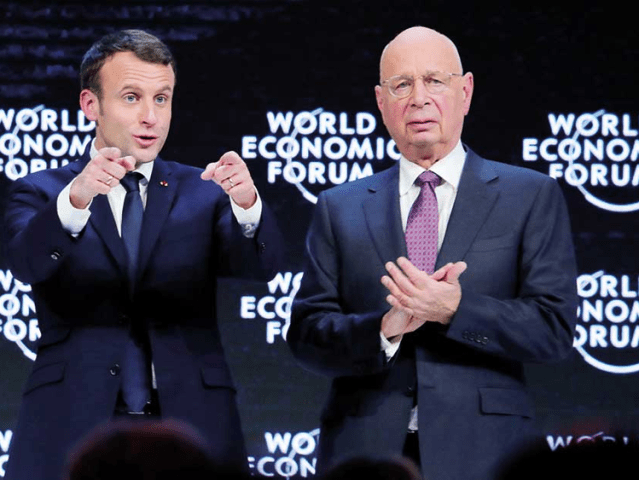
President Emmanuel Macron has implemented several policies that align with the World Economic Forum’s (WEF) globalist vision and goals, and many aspects of his policies will have dystopian implications.
Here are just a few examples:
- Surveillance and Security Measures: In response to terrorism and security threats, Macron’s administration has proposed and implemented measures that expand surveillance powers and law enforcement authority.
Critics argue that these policies could infringe on personal privacy and civil liberties. For example, a controversial “global security” bill was proposed in 2020, which included provisions to restrict the filming of police officers and expand the use of drones for surveillance [1].
- Labour Market Reforms: Macron has pursued labour market reforms aimed at increasing flexibility and reducing unemployment.
However, critics argue that some of these reforms will undermine workers’ rights and protections, potentially leading to increased job insecurity and income inequality.
For instance, the 2017 labour reforms made it easier for companies to hire and fire employees, which some argue could exacerbate precarious working conditions [2].
- Digital Transformation and Privacy Concerns: While Macron has promoted digital transformation within France and the European Union, critics argue that the increased reliance on technology could lead to privacy concerns and increased surveillance.
For example, the use of facial recognition technology in public spaces raises serious concerns about potential abuse and the erosion of individual privacy [3].
- COVID-19 Response and Potential Erosion of Freedoms: Macron has played a significant role in the outrageous global response to the alleged COVID-19 pandemic.
The measures implemented to allegedly curb the spread of the virus seriously impeded human rights and eroded individual freedoms.
For example, Macron’s introduction of health passes/vaccine passports, which require proof of vaccination or a recent negative test to access certain public spaces, is an infringement on personal liberties [5].
References: [1] https://www.aljazeera.com/news/2020/11/28/france-security-bill-protests [2] https://www.bbc.com/news/world-europe-41094785 [3] https://www.reuters.com/article/us-france-facial-recognition/france-plans-to-use-facial-recognition-to-let-citizens-access-government-services-idUSKBN1WI1YU [4] https://www.theguardian.com/world/2018/apr/22/emmanuel-macron-under-fire-over-frances-new-immigration-law [5] https://www.bbc.com/news/world-europe-57998653
These examples demonstrate that French President Emmanuel Macron’s policies align with the WEF’s globalist vision and goals, and they raise serious concerns about potential dystopian consequences and infringements on human rights.
Jacinda Ardern, the now former Prime Minister of New Zealand, is another prominent example of a WEF Young Global Leader who gained significant political influence.
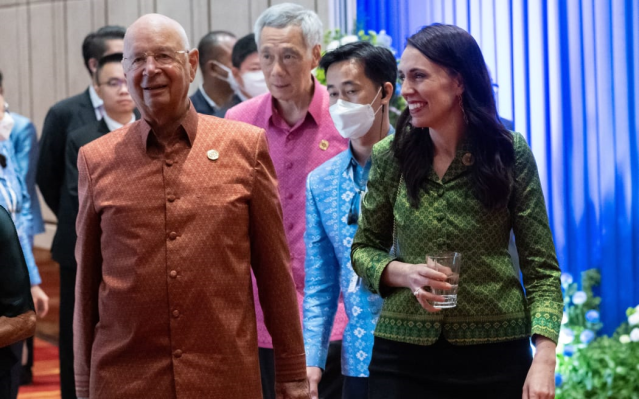
Ardern, a member of the YGL Class of 2014, has been praised for her leadership during crises such as the Christchurch mosque shootings and the COVID-19 pandemic. Despite the fact, New Zealand suffered a 3203% increase in excess deaths due to the mandatory Covid-19 vaccination laws Jacinda Ardern enforced.
The island suffered 2,169 excess deaths in 2021 and then a shocking 5,286 excess deaths by week 49 of 2022. These are terrifying figures for a small island with an estimated population of just 5 million.
Especially when compared to 2020, when no excess deaths were suffered and 160 fewer deaths were actually recorded than expected at the height of the Covid pandemic and prior to the rollout of the Covid injections.
This means New Zealand suffered a shocking 3,203% increase in excess deaths in 49 weeks throughout 2022 compared to 53 weeks throughout 2020.
Now, Jacinda Ardern has been appointed by current New Zealand PM Chris Hipkins to travel around the world, funded by the taxpayer, to promote her extreme views on Government and Media control and censorship of free speech.
Jacinda Ardern’s rise to power highlights the nefarious reach of the WEF and its ability to identify and support future leaders to carry out its bidding.
Leo Varadkar, Taoiseach (Prime Minister) of Ireland, was a WEF Young Global Leader in 2013, prior to becoming the country’s leader in 2017 for the first time, and then returning to the position in 2022 (2).
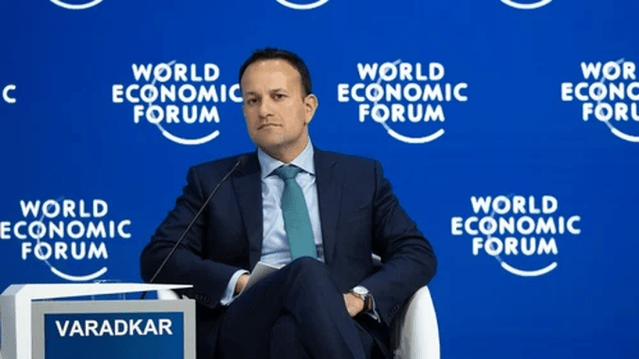
During his time in office, Varadkar has played a crucial role in shaping Ireland’s response to Brexit and implementing dystopian policies that align with the WEF’s globalist vision.
Here are a few examples:
- Data Privacy and Security Concerns: Under Varadkar’s leadership, Ireland has pursued digital transformation policies, including the establishment of a national digital strategy.
However, critics argue that such policies could potentially compromise data privacy and security.
For instance, the government’s plans to introduce a Public Services Card (PSC), which aimed to streamline access to public services, raised concerns about data protection and privacy [1].
- Climate Change and Energy Policies: While Varadkar has been a vocal advocate for addressing climate change and transitioning to renewable energy sources, critics argue that some of the government’s policies could disproportionately impact low-income households.
For example, the carbon tax increase introduced in 2019, which aimed to reduce greenhouse gas emissions, was criticized for potentially exacerbating energy poverty and disproportionately affecting vulnerable communities [2].
- Housing Crisis and Homelessness: During Varadkar’s tenure as Taoiseach, Ireland experienced a housing crisis, marked by soaring rents and a significant increase in homelessness.
The government’s response to the crisis was insufficient and policies favoured private interests over public needs.
For instance, the government’s reliance on private-sector solutions, such as the Housing Assistance Payment (HAP) and the “Rebuilding Ireland” plan, was criticized for not adequately addressing the root causes of the crisis and potentially exacerbating the problem [3].
- COVID-19 Response and Civil Liberties: Like other world leaders, Varadkar played a significant role in Ireland’s response to the alleged COVID-19 pandemic. But the measures implemented to curb the spread of the virus eroded civil liberties.
For example, the introduction of lockdown measures and restrictions on gatherings was and is an infringement on personal freedoms [4].
References: [1] https://www.irishtimes.com/opinion/public-services-card-is-a-data-protection-nightmare-1.3197741 [2] https://www.irishtimes.com/news/environment/carbon-tax-increases-should-be-offset-by-support-for-vulnerable-1.4039101 [3] https://www.irishexaminer.com/opinion/commentanalysis/arid-30923684.html [4] https://www.irishtimes.com/news/ireland/irish-news/covid-19-further-legal-challenge-to-lockdown-measures-dismissed-by-high-court-1.4257243
These examples demonstrate that Varadkar’s dystopian policies align with the WEF’s globalist vision.
Canadian Prime Minister Justin Trudeau was also a member of the Young Global Leaders (YGL) program in 2010. Then five years later, Trudeau was appointed Prime Minister and the Cabinet he chose were sworn in by Governor General David Johnston on November 4, 2015.
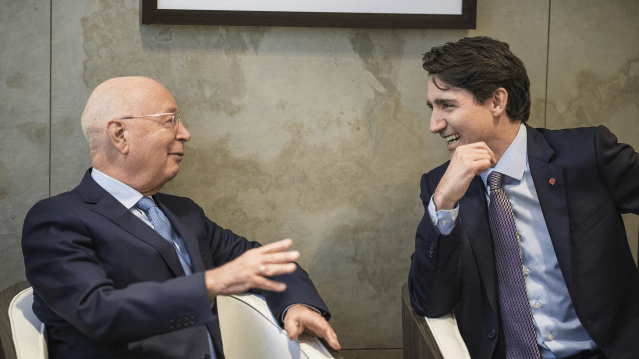
Trudeau has also implemented dystopian policies that align with the World Economic Forum’s (WEF) globalist vision.
Here are a few examples:
- Carbon pricing and climate change policies: Trudeau’s government has implemented a carbon pricing system to reduce greenhouse gas emissions, aligning with the WEF’s focus on sustainability and environmental responsibility.
Critics argue that this policy disproportionately affects lower-income households and rural communities, raising concerns about economic inequality.
- Internet regulation: Trudeau’s government has proposed new regulations for online content, including Bill C-10 and Bill C-36, aimed at addressing hate speech and misinformation.
Critics argue that these measures could infringe on freedom of speech and may lead to government censorship, which some view as a dystopian outcome.
- COVID-19 pandemic response: Trudeau’s government has implemented various measures to control the spread of COVID-19, such as lockdowns, travel restrictions, and vaccine mandates.
These measures infringe on individual liberties and represent an overreach of government authority, which is extremely dystopian.
Sanna Marin, Prime Minister of Finland, is another Young Global Leader who has made her mark on the international stage.
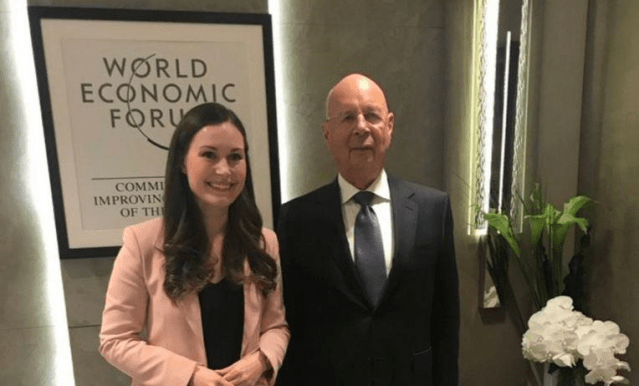
A member of the Young Global Leader Class of 2020, Marin became the world’s youngest-serving prime minister when she took office in December 2019 (3).
She has since been a vocal advocate for progressive policies, including climate change mitigation and gender equality, which align with the WEF’s goals.
These examples of WEF Young Global Leaders who have infiltrated governments around the world demonstrate the organization’s influence and its ability to shape the future of global leadership.
It is crucial for critical thinkers to remain vigilant about the potential implications of this power and ensure that the WEF’s initiatives are held accountable to the public interest.
The Great Reset and Its Potential Dystopian Implications
The WEF’s Great Reset initiative, relaunched in 2020, allegedly aims to reshape global systems and policies in response to the alleged COVID-19 pandemic (5).
While technocrats and globalists argue that this plan is necessary to address pressing global challenges, others rightly fear it will lead to a dystopian future where unelected institutions like the WEF hold considerable power. Make no mistake, the Great Reset will be used to advance a globalist agenda, erode national sovereignty, and undermine individual freedoms (6).
The potential enforcement of the Great Reset will have significant consequences for the world, including increased surveillance, restricted personal freedoms, and a shift towards a more centralized global governance system.
It is crucial for critical thinkers to scrutinize the WEF’s actions and hold them accountable to ensure that any changes made are in the best interests of people worldwide.
The World Economic Forum and its Young Global Leaders programme have drawn attention to their huge influence on global governance and the dystopian implications of initiatives like the Great Reset.
As citizens who are concerned about the future, it is essential to be vigilant and question the intentions and actions of powerful, unelected institutions like the WEF.
Otherwise, you might just find yourself owning nothing, and not being very happy about it.

Sources:
- World Economic Forum. (n.d.). Our History. Retrieved from https://www.weforum.org/about/world-economic-forum
- World Economic Forum. (n.d.). Young Global Leaders. Retrieved from https://www.younggloballeaders.org/
- Schwab, K. (2017). The Fourth Industrial Revolution. Currency.
- Chazan, D. (2017). Profile: Emmanuel Macron, France’s youngest president. The Telegraph. Retrieved from https://www.telegraph.co.uk/news/0/profile-emmanuel-macron-frances-youngest-president/
- World Economic Forum. (2020). The Great Reset. Retrieved from https://www.weforum.org/great-reset
- Furedi, F. (2021). The Great Reset’s Dystopian Vision. Spiked. Retrieved from https://www.spiked-online.com/2021/02/22/the-great-resets-dystopian-vision/
- MacDiarmid, N. (2019). Jacinda Ardern: The World’s Youngest Female Leader. Forbes. Retrieved from https://www.forbes.com/sites/nickmorrison/2019/07/31/jacinda-ardern-the-worlds-youngest-female-leader/
- O’Connell, H. (2017). Profile: Who is Leo Varadkar, Ireland’s new Taoiseach? The Irish Times. Retrieved from https://www.irishtimes.com/news/politics/profile-who-is-leo-varadkar-ireland-s-new-taoiseach-1.3109512
- Sorensen, M. (2019). Sanna Marin of Finland to Become World’s Youngest Prime Minister. The New York Times. Retrieved from https://www.nytimes.com/2019/12/09/world/europe/finland-sanna-marin.html
This article has been archived for your research. The original version from The Exposé can be found here.



